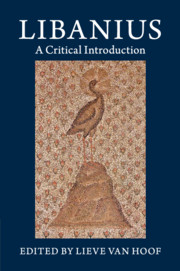Book contents
- Frontmatter
- Dedication
- Contents
- List of tables
- Notes on contributors
- Preface
- Abbreviations
- Introduction: Libanius at the margins
- Part I Reading Libanius
- Chapter 1 Libanius’ Life and life
- Chapter 2 The historical context: the rhetoric of suffering in Libanius’ Monodies, Letters and Autobiography
- Chapter 3 The rhetorical context: traditions and opportunities
- Part II Libanius’ texts: rhetoric, self-presentation and reception
- Part III Contexts: identity, society, tradition
- Appendices: survey of Libanius’ works and of available translations
- References
- Index locorum
- General index
Chapter 2 - The historical context: the rhetoric of suffering in Libanius’ Monodies, Letters and Autobiography
from Part I - Reading Libanius
Published online by Cambridge University Press: 05 October 2014
- Frontmatter
- Dedication
- Contents
- List of tables
- Notes on contributors
- Preface
- Abbreviations
- Introduction: Libanius at the margins
- Part I Reading Libanius
- Chapter 1 Libanius’ Life and life
- Chapter 2 The historical context: the rhetoric of suffering in Libanius’ Monodies, Letters and Autobiography
- Chapter 3 The rhetorical context: traditions and opportunities
- Part II Libanius’ texts: rhetoric, self-presentation and reception
- Part III Contexts: identity, society, tradition
- Appendices: survey of Libanius’ works and of available translations
- References
- Index locorum
- General index
Summary
Introduction
In 365, Libanius wrote a letter to Theodorus, a friend serving as the governor of Bithynia, and thanked Theodorus for a portrait that he had sent of the famous second-century rhetorician Aelius Aristides. The remarkable letter reads like something that the leader of a modern fan club would write about a picture of a teen idol. Libanius sat by the portrait and read a work of Aristides. When he looked deeply at the portrait, Libanius knew that ‘it was only proper that such a handsome man should produce such eloquence’ (Letter 1534.2). But this was not the first painting of Aristides that Libanius had received. Four years earlier, Libanius’ friend Italicianus had sent another portrait of Aristides, though one that Libanius (who appears to have been a connoisseur of such things) thought showed his idol with too much hair. Libanius concludes by asking for a third picture of Aristides that shows ‘his hands and feet’ and requesting that his friend ask some old men ‘What is the idea with the hair?’ – two odd requests that only the most dedicated admirer would make.
It is fitting that Libanius felt such kinship with Aristides. Not only were both men accomplished rhetoricians, but they each shared something of the same character. In fact, Libanius seems at times to have modelled his self-presentation on Aristides. Both Aristides and Libanius claimed with pride to have kept emperors waiting before delivering welcoming discourses. They also famously possessed rather delicate constitutions. Aristides’ particular personal foibles have become well known primarily through his Sacred Tales, a work which certainly provides an extremely exaggerated view of the sophist’s peculiar interests. Libanius rarely gets the same sneering scrutiny. Instead, scholars tend to accept Libanius’ frequent complaints about his emotional and physical maladies as more or less accurate descriptions of his condition at a given moment in his life.
- Type
- Chapter
- Information
- LibaniusA Critical Introduction, pp. 39 - 58Publisher: Cambridge University PressPrint publication year: 2014
- 4
- Cited by



